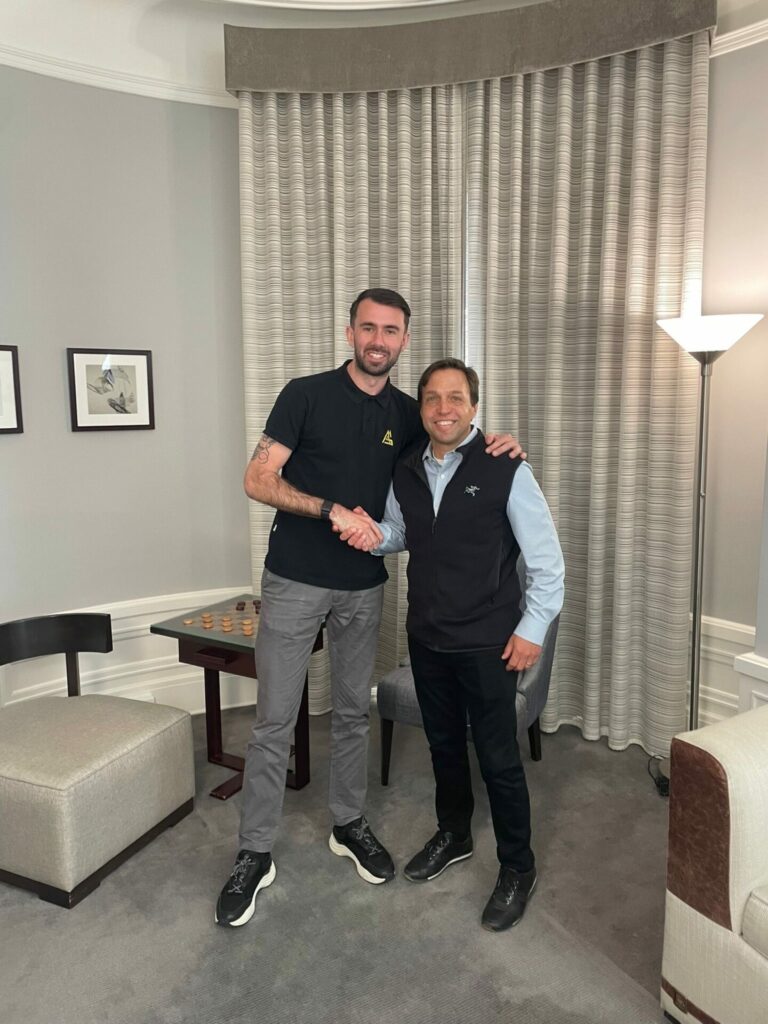During our recent trip to San Francisco for the RSA Cybersecurity Conference, our Co-Founder, Joe, sat down with Ken Elefant, Co-Founder and Partner at Sorenson Capital.
Sorenson Capital is a venture capital firm that invests in product-oriented early and growth-stage B2B software companies. Ken co-founded the firm’s early-stage practice in 2017, alongside Rob Rueckert. Sorenson Capital has rapidly gained a reputation as an active and hands-on investor with technical expertise, industry and market knowledge, and go-to-market playbooks to support management teams as they build lasting businesses. Ken is frequently recognized as one of the most well-connected figures in the tech world.
Join us as we dive into Ken’s journey in cybersecurity, uncover his funding criteria, and gain invaluable insights from one of the industry’s top investors.

What did your journey into the industry look like?
Before college, I had dreamed of becoming a pilot and I was successful in getting into the Air Force Academy, which was awesome. The only issue was that I discovered I was colour blind during the final tests, so they wanted me to be a flight engineer instead, but I just wanted to become a pilot. So, moving forward, I thought I’d try my hand at something else and was lucky enough to get unto Wharton Undergrad at the University of Pennsylvania. I came out with a degree in finance, and I was fortunate enough that I had built connections at a few companies in the Bay Area and I landed my first job at Apple!
How did you evolve from Finance to Cyber?
Originally, I joined Apple focusing on financial planning for their software organization called Claris Corp. I was shipped off to Europe, and I lived in London and eventually Amsterdam to run the sales and marketing from the Benelux region. I then moved to a company called Radius which made monitors and graphics cards and oversaw all the international sales and marketing for, at this point, a mid-sized public company. I truly think that every venture capitalist should go carry a bag and do sales. It’s super important to help your companies understand and so you can empathize with their problems.
Following that, I studied at Harvard Business School and took part in the Kauffman Fellows Program, which is initially what got me into venture in 1999. So, I then worked at Battery Ventures doing software and security investments, moving to Lightspeed after my Kauffman Fellowship was done. And then after that, I went to Intel Capital, where I was running the security and software groups, so it was great experience. I learned a lot from all three companies – from Battery Ventures I learnt how to do theme-based prospecting, really going deep in a space, and understanding the competitive landscape. At Lightspeed, I got to figure out what it’s like to go try and really work with the best people around – what I know call people prospecting. And then at Intel Capital, I learnt how you work with the entire ecosystem. When I eventually started Sorenson Capital with my partner Rob Rueckerts, we ended up going out with 100 million on the cover, closed at 110 million. And away we go – so, that’s how it all happened in a nutshell.
What would you say was the turning point to go for it?
Whilst it was a long time in the making, I’d say that, when I was at Lightspeed, I realised that I genuinely love this business. I love helping entrepreneurs – this business is one that massively relies on your network, your experiences, and your track record to get the best deals. So, in 2017, it was the perfect time for us to go for it. At Sorenson Capital, we have two funds – the early-stage fund and the venture fund. We’re typically investing four million per start-up, which is typically seed completely with pre-revenue companies. We do security, we do all B2B software, which includes security, we do infrastructure software, workflow software, and what we call analytics and AI. Those are the main spaces that we go after.
What do you look for when evaluating companies?
There are three main things we look for – the team, a rapidly growing market and then the differentiation. In terms of the team, we look to see if the has the domain experience to solve the problem they set out to, and whether they have the passion. We like to go after small but rapidly growing markets because, by definition, if you are going after a large marker then there’s already large competitors. Finally, we need to see your differentiation. This could be technical, channel, market – whatever it is, it needs to be sustainable.
When you’re looking at the team founders, are there any common traits they have?
The main thing we look for in founders are people who are completely mission driven and will persevere. I’m not perfect, you’re not perfect, but the best entrepreneurs are the ones who are constant learners, constant networkers and always moving to make their start-ups more successful. The second thing we look for are good business acumen – people who are smart enough and can build a big platform.
Are there any common mistakes founders make when they’re reaching out to you?
The first thing is that if I was a founder, I would try and figure out who is one of the best people that can connect you with the VC firm. Because we do see about 3 ,000 security start-ups a year, right? And we only invest in seven or eight companies a year at the early-stage fund. The second thing is being self-introspective on what either your board, an advisor, or your VC fund can do to help you.
Are there any areas that you’re really interested in?
There are all sorts of new attack vectors that are happening, both on cloud and on prem. I think there is room to be disruptive in the compliance space, and I’m big on GovTech as well. There are dozens of spaces that I think are up for grabs and, ultimately, what’s important is that start-ups really understand the ecosystem, their competitors and how they compete.
